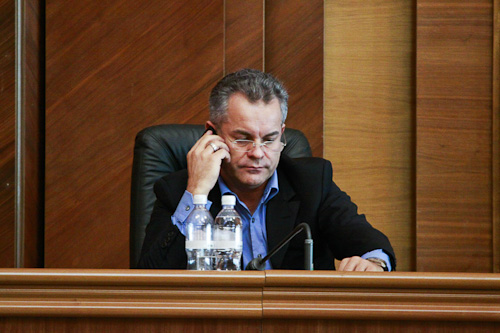
Plahotniuc’s Power Base in Moldova: Allies and Instruments (Part One)
Publication: Eurasia Daily Monitor Volume: 13 Issue: 7
By:

The political influence of billionaire businessman Vladimir Plahotniuc expanded seemingly unstoppably in Moldova’s state institutions and political system during the year just past (see EDM, October 19, 2015; November 3, 4, 19, 20, 2015; January 11, 2016). At the turn of 2015–2016, Plahotniuc moved to designate either himself or a nominee of his own for the vacant post of prime minister, in a controlled coalition. The climactic moment is expected in the second week of January 2016. Plahotniuc is the Democratic Party’s de facto leader, while the party’s official head, Marian Lupu, represents Plahotniuc in inter-party negotiations (Plahotniuc would intervene openly in make-or-break situations).
Although he has a minority party under his direct control (only the fourth-largest parliamentary party, following the November 2014 elections), Plahotniuc is a masterful political operator, apparently equaling his financial mastery. He has now moved close to completing a process of state capture, maximizing his political influence through tactical alliances with other groups, and subduing his remaining opponents through political control of key law enforcement bodies.
Plahotniuc built up his power base under the “pro-Europe” coalition government’s cover, amassing a wide range of instruments and gaining additional ones during 2015. Power instruments currently at his disposal include:
- Long-term political alliances. Plahotniuc’s Democratic Party and Mihai Ghimpu’s smaller Liberal Party have operated a real coalition within the nominal coalition, undermining three consecutive Liberal-Democrat prime ministers (Vlad Filat, Iurie Leanca, Valeriu Strelet). The Liberal-Democrats with their European reform agenda were the main obstacle to Plahotniuc’s unlimited ambitions, hence Plahotniuc decided to reduce that party to an obedient rump. Ghimpu coalesced with Plahotniuc to destroy the Liberal-Democrats because these held firmly the political center-right, confining Ghimpu’s party to a niche on the far right (Moldovan definition of Romanian irredentism). Following the removal of Strelet in October 2015, the interim prime minister is the health minister Gheorghe Brega from the Liberal Party, a benign figurehead.
- Short-tem “situational” alliances. Outside the nominal pro-Europe alliance, Plahotniuc’s party operates ad hoc parliamentary alliances and combinations with the Communist and Socialist parties. He has enlisted these parties for crucial parliamentary votes, e.g. the removal (2013) and arrest (2015) of Filat, removal of Strelet (October 2015), or blocking Liberal-Democrats’ initiatives to release certain law enforcement agencies from subordination to the Parliament. That formal subordination provides cover for Plahotniuc’s de facto control of those agencies (see below), thanks to his ability to manipulate the Parliament itself.
- Manipulation of parliamentary processes. The Parliament’s chairmanship was allocated to Plahotniuc’s Democratic Party by agreement among the coalition’s parties. The Parliament’s chairman since January 2015, Andrian Candu, is Plahotniuc’s own godson. Their Democratic Party has an informal deal with the Communist Party since February 2015 that has added 20 Communist votes to the Democratic Party’s 19 votes, Ghimpu’s 13 votes, and 4 “unaffiliated” deputies lured from other parties, including former prime minister “Iurie Leanca’s group” of 3 defectors from Filat’s party. All these amount to a Plahotniuc-controlled majority in the 101-seat parliament. This majority can be employed flexibly as needed. On December 21, 2015, Plahotniuc personally formed a “Social-Democrat Platform” of his own parliamentary group with 14 of the Communist deputies (Infotag, IPN, December 21, 22, 2015). Ghimpu’s party and Leanca’s group can, in turn, abstain from some votes, if they feel uncomfortable voting alongside Communists; in that case the Socialist Party would contribute their own 24 parliamentary votes to provide a “situational” majority (see above).
- Control of law enforcement bodies. The governing coalition’s founding agreement had allocated top posts in certain law enforcement institutions to the Democratic Party. As a result, Plahotniuc’s appointees control the Anti-Corruption Center (a militarized agency), the Prosecutor General’s Office with its various branches, the National Commission for Integrity (supposedly it investigates conflicts of interest that involve state officials), and a governmental telecommunications and data center. The Democratic Party also controls parts of the court system, and it took over the Justice Ministry through a government reshuffle in 2015. These institutions have done little about Moldova’s rampant corruption, but have selectively targeted the Liberal-Democrat Party. They raided then-prime minister Filat’s offices and home in 2013, threatening with arrest and prosecution to force his dismissal; they “leaked” audio and video materials of dubious authenticity or legality, purporting to incriminate Liberal-Democrat ministers and other officials during 2013–2015; they hold several of Filat’s relatives in jail since 2014, and Filat himself since October 2015, on charges that the prosecutors have shifted several times since then.




